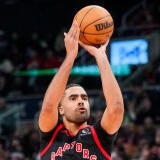Friday 5 With KB 7.20.12: When pigs fly
In this week's edition of the Friday 5 with Ken Berger, the CBSSports.com NBA Senior Writer talks Ray Allen's departure, the start of a new Linsanity in Houston, and of course, Dwight freaking Howard.
By
Matt Moore
•
3 min read

In this week's edition of the Friday 5 with Ken Berger, the CBSSports.com NBA Senior Writer talks Ray Allen's departure, the start of a new Linsanity in Houston, and of course, Dwight freaking Howard.
1. You've argued in defense of the Knicks letting Jeremy Lin walk. What, in your mind is the ceiling for the Rockets in terms of what they could get with Lin?
KB: I think best-case scenario they get a very solid starting point guard, which is nothing to sneeze at. Point-guard play is so crucial, and you don't have to be an All-Star to impact winning at that position. But looking back on Linsanity, I just thought it was A) such a small sample size, B) so inherently driven by the perfect fit between Lin's talents and Mike D'Antoni's offense, C) impossible to replicate over a larger sample size, and D) impossible to project three years into the future. Given all those variables, how could the Knicks take up $15 million of cap room three years from now? The way the Arenas rule works, the Rockets' average cap hit of $8 million a year or so is more manageable.
2. There's obviously some bad feelings left over in Boston from Ray Allen taking his talents to South Beach. Are you surprised that the normally tight Celtics had such a fracture?
KB: I think it was mostly business with a small personal component. But as for the personal component, I'm not surprised that Ray was the one who left. He's one of the most practical and pragmatic athletes I've ever covered, and he really does view this from a business point of view. Ray Allen is CEO of Ray Allen Inc. and is going to do what's best for the company, so to speak. He's also sensitive and needs everything to be just so in order to be comfortable. Clearly, he had lost his comfort zone in Boston. But I must say, with the addition of Jason Terry and now Courtney Lee, the Celtics have recovered nicely.
3. Surprised that O.J. Mayo fell down the list as far as he did?
KB: He kind of got caught in that Eric Gordon waiting game, and once the music stopped in the musical chairs of two-guard free agency, it was hard to find a place to sit. For a former No. 3 pick to get such a modest deal in free agency is both a sign that the CBA is working and also a sign of unintended consequences. When a small-market team like Memphis lets a player go, chances are there will be a big-market team waiting in the wings to poach that talent -- either with cap room, in the Mavs' case, or with the tax-payer mid-level, which is an exception that only tax-paying teams can use and only tax-paying teams can afford. Interesting dynamic. It turns out I was spending all those summer and fall evenings in Manhattan last year watching a monster being constructed.
4. You wrote about the sponsor patches on jerseys from the Board of Governors on Thursday. What's your opinion on the NBA putting them into action?
KB: I admit it's a little cheesy, but who am I to stand on principle and say NBA teams should forgo $100 million a year in revenues simply to uphold decorum? At those prices, they could've just agreed last July 1 to put three sponsorship patches on the jerseys, washed away the $300 million in annual losses, and had an 82-game season instead of a lockout. In other words, money talks.
5. I'm putting you on the spot, here, Berger. Dwight Howard will be traded sometime before ______.
KB: Hell freezes over? Pigs fly? Shaq says something coherent on TNT? You're making this too easy for me, Matt. Way too easy. But honestly, I don't sense too much urgency on the Magic's part to trade him. And Dan Fegan's comment that Howard is hellbent on testing free agency next summer no matter what is both A) posturing and B) a fact. So the best I can do is guesstimate that there's a 100 percent chance he's traded by the February trade deadline and a 50 percent chance he's traded before the start of the season. Any prognosticating beyond that would be futile.
KB: I think best-case scenario they get a very solid starting point guard, which is nothing to sneeze at. Point-guard play is so crucial, and you don't have to be an All-Star to impact winning at that position. But looking back on Linsanity, I just thought it was A) such a small sample size, B) so inherently driven by the perfect fit between Lin's talents and Mike D'Antoni's offense, C) impossible to replicate over a larger sample size, and D) impossible to project three years into the future. Given all those variables, how could the Knicks take up $15 million of cap room three years from now? The way the Arenas rule works, the Rockets' average cap hit of $8 million a year or so is more manageable.
2. There's obviously some bad feelings left over in Boston from Ray Allen taking his talents to South Beach. Are you surprised that the normally tight Celtics had such a fracture?
KB: I think it was mostly business with a small personal component. But as for the personal component, I'm not surprised that Ray was the one who left. He's one of the most practical and pragmatic athletes I've ever covered, and he really does view this from a business point of view. Ray Allen is CEO of Ray Allen Inc. and is going to do what's best for the company, so to speak. He's also sensitive and needs everything to be just so in order to be comfortable. Clearly, he had lost his comfort zone in Boston. But I must say, with the addition of Jason Terry and now Courtney Lee, the Celtics have recovered nicely.
3. Surprised that O.J. Mayo fell down the list as far as he did?
KB: He kind of got caught in that Eric Gordon waiting game, and once the music stopped in the musical chairs of two-guard free agency, it was hard to find a place to sit. For a former No. 3 pick to get such a modest deal in free agency is both a sign that the CBA is working and also a sign of unintended consequences. When a small-market team like Memphis lets a player go, chances are there will be a big-market team waiting in the wings to poach that talent -- either with cap room, in the Mavs' case, or with the tax-payer mid-level, which is an exception that only tax-paying teams can use and only tax-paying teams can afford. Interesting dynamic. It turns out I was spending all those summer and fall evenings in Manhattan last year watching a monster being constructed.
4. You wrote about the sponsor patches on jerseys from the Board of Governors on Thursday. What's your opinion on the NBA putting them into action?
KB: I admit it's a little cheesy, but who am I to stand on principle and say NBA teams should forgo $100 million a year in revenues simply to uphold decorum? At those prices, they could've just agreed last July 1 to put three sponsorship patches on the jerseys, washed away the $300 million in annual losses, and had an 82-game season instead of a lockout. In other words, money talks.
5. I'm putting you on the spot, here, Berger. Dwight Howard will be traded sometime before ______.
KB: Hell freezes over? Pigs fly? Shaq says something coherent on TNT? You're making this too easy for me, Matt. Way too easy. But honestly, I don't sense too much urgency on the Magic's part to trade him. And Dan Fegan's comment that Howard is hellbent on testing free agency next summer no matter what is both A) posturing and B) a fact. So the best I can do is guesstimate that there's a 100 percent chance he's traded by the February trade deadline and a 50 percent chance he's traded before the start of the season. Any prognosticating beyond that would be futile.

















